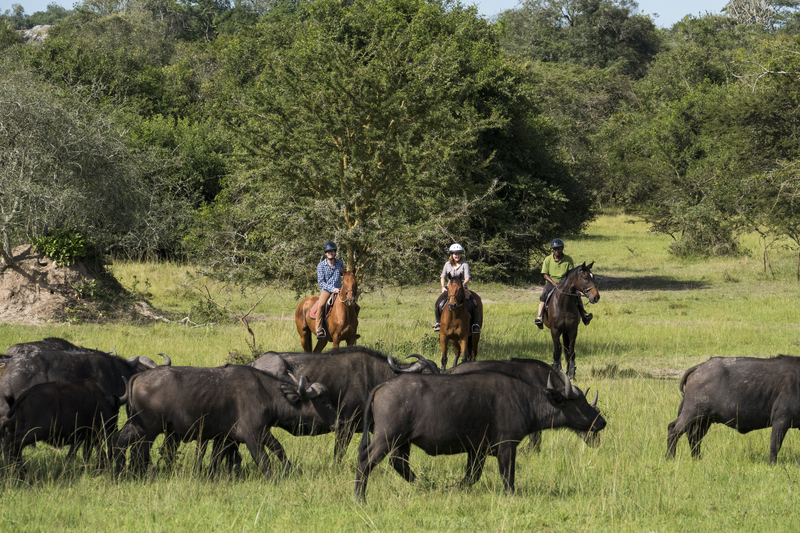Is Uganda Safe To Visit In 2024? Everything To Know : Is it safe to travel to Uganda? Though the information below is intended for visitors interested in discovering a post-pandemic world, Uganda is generally safe for travel. Otherwise, read this guide to safety in Uganda, which addresses everything from the coronavirus to things to consider while traveling alone.

In general, travel to and from Uganda is safe. It is regarded as a politically stable nation with well-kept boundaries. But like in any other nation, opportunistic crimes like credit card fraud, home robbery, and petty theft happen. If you use prudence and abide by local regulations, you can avoid terror-prone locations and modern criminal concerns.
Is Uganda safe to visit or travel to in 2024?
Are there terrorist attacks in Uganda? Will someone steal my camera in Kampala’s streets? Is driving safe, or should I be concerned about carjacking? Can people safely eat and drink the food and water? All of these are common inquiries we have before visiting other countries.
It is normal for a guest to feel uneasy when visiting a foreign location. With thousands of tourists safely visiting each year, Uganda is quickly becoming a well-liked vacation adventure destination, particularly for viewing the mysterious primates in their old tropical forest.
As to UK international travel guidance, approximately 15,000 British nationals visit Uganda securely each year. The majority of visits go smoothly. In London or New York, you have a higher chance of dying in a terrorist strike than in Uganda. And no, there hasn’t been a war going on in Uganda since the 1980s.
Indeed, Uganda is a secure travel location for female travelers. Although there is crime in the nation, much of it targets residents rather than female visitors. While you are here, be cautious and refrain from going out late on your own. But you can’t truly overcome your fear of the unknown until you have all the information at your disposal. Thus, this blog guide should act as your travel advisor for Uganda.
“If a terrorist strike occurs in London or New York, your chances of dying are fifty times higher than in Uganda”. Furthermore, there hasn’t been a civil war in Uganda since the 1980s.
Terrorism and regional security in Uganda.
In what officials refer to as a “cowardly terrorist act,” attackers brutally attacked a honeymooning couple and their safari guide on October 17, 2023, in Queen Elizabeth National Park in southwest Uganda, killing them both tragically. For a long time, Uganda has not seen many large-scale incidents of this nature, which has made us forget the reality of terrorism. We offer our condolences to the victims, and in an effort to catch the perpetrators, security has been stepped up.
It’s important to emphasize that the incident at the park seems to be an isolated incident, and we trust our security forces to handle the situation quickly before it becomes the subject of sensationalized media coverage, as is often the case. Uganda is still a safe place to travel. We urge visitors to stick to their schedules, pointing out that around 10% of Ugandans rely on money from tourism. Moreover, a large number of citizens live in tranquil rural locations that are not impacted by the increased tension shown in skewed travel recommendations.
Thanks to attentive citizens and extremely active security forces, Ugandans have enjoyed extended periods of terror-free places for a considerable amount of time. Ugandan men and women have been leading on the frontlines of the nation’s security forces’ long-running collective wars against terrorism, whether they are fighting the cross-border Al-Shabaab in Somalia or domestic terror cells like the Lord’s Resistance Army (LRA), the Allied Democratic Forces (ADF), or other groups.
Regretfully, some people are able to get past security checks and take the lives of innocent people in the name of their faith, regardless of how vigilant they are. Another tragic episode that occurred recently was in November 2021. In response to three suicide bombs that went off in Kampala, killing the bombers and four citizens, there was a heightened threat of terrorism throughout the East African region. The GoU issued many notifications informing people of an increased risk of terrorism following several bombings that occurred in the same month. Nevertheless, the threats were quickly eliminated.
Terror attacks are uncommon in Uganda.
Terrorist strikes can occur anywhere, even in locations that international visitors and expatriates frequently visit. Public spaces and sizable throngs of people could also be targets.
Together, regional security forces work to eliminate terrorists’ safe havens, eliminate terrorist funding sources, lessen state vulnerability, and improve responsiveness and preparedness for emergencies. Uganda is the largest donor to the AMISOM forces operating under the African Union’s aegis. Uganda has led the charge in combating the terrorist organization Al-Shabaab in that role.
The governments of Uganda’s surrounding countries have helped to make it easier to apprehend terrorist ringleaders. The general public in Uganda has been urged to exercise caution and to always be on the alert. Because of the efficacy of these initiatives, terrorist leaders were apprehended before they could carry out their heinous deeds.
Uganda is still pursuing the terrorists in an effort to foil their plans before they have a chance to harm innocent people.
Always be on the lookout for potential threats, particularly in crowded areas and public spaces like restaurants, bars, hotels, transportation hubs, and large gatherings like sporting or religious events. You should also be cautious when near government offices or security facilities like police stations. In Uganda, there have been prior terrorist attacks and attempted attacks that have targeted government buildings, restaurants, bus stops, security personnel, and football stadiums.
Alerts are frequently released by the Uganda Police Force, especially in the run-up to festivals and religious occasions. Always be on the lookout for threats and heed the authorities in your area.
Safety and security in Uganda

Similar to any other nation on earth, there is a risk of crime, but it is preventable if you exercise prudence. Although Uganda is a highly safe country, like any other, it occasionally experiences opportunistic crimes such as home invasions, credit card fraud, and petty theft. The likelihood of becoming a victim is low, and incidents would most likely occur in major cities like Kampala. Please use caution and vigilance when in public spaces by keeping your profile low and becoming less vulnerable to pickpocketing.
The Uganda People’s Defence Force (UPDF), also referred to as the local police, has shown increased success in preventing crime through routine patrols and deployment in high-crime areas. Everywhere one looks, there is a police presence, with concealed security posted at the airport, borders, and public areas.
The tourism police, park rangers, military army, and hotel and lodge security professionals are all present to protect the safety of travelers across Uganda’s national parks and tourist spots.
Is Uganda safe for same-sex or gay couples to visit?
The Anti-Homosexuality Law was passed by the Ugandan president in June 2023, but it hasn’t affected the friendly and upbeat vibe that permeates Ugandan society. The law doesn’t punish homosexuals; it just forbids encouraging homosexuality in minors and in public. Gay couples only need to respect Ugandan culture and refrain from advocating LGBTQ rights while there—they will face no threats from the country’s citizens or legislators. Furthermore, most of these bills are political in nature and have little to no effect on changing society.
Did you know that, since the beginning of 2023, state legislatures in the United States have considered at least 417 anti-LGBTQ bills?
Lesbian, homosexual, bisexual, and transgender (LGBTQ) rights are not as widely acknowledged in Uganda as they are in Western nations, as they are in most African nations. Although Ugandans are aware that there are individuals who are sexually attracted in that way, it is something we choose to leave in the privacy of the person. One of the 34 states where homosexuality is prohibited by law—recognized by the UN, the African Union, or both—is Uganda. Under the cover of religion, many of the laws that make it illegal to promote homosexuality in many African nations date back to the colonial era.
As a gay or LGBTQ person traveling to Uganda, stay away from spreading the word about your lifestyle and show respect for local customs. No gay traveler visiting Uganda would face harassment or a lack of acceptance based solely on their sexual orientation. Ugandans value cultural norms and expect visitors to respect them. For instance, they frown upon public displays of affection, such as holding hands, embracing, or kissing in public, and they don’t talk about sexual things in public.
Strangely, it’s common for friends of the same sex—gay or not—to stroll hand in hand in public. When a close friend of the same sex from Uganda reaches out and grabs your hand when they first meet, don’t be alarmed. It’s a kind salutation that’s especially suitable for buddies.
It would take some rather overt behavior on the part of the gay guest for any Ugandan to take offense or, for that matter, attack you, even if homosexuality is taboo in the country. Therefore, if you identify as LGBTQIA and are traveling to Uganda, please try not to assert your sexual rights and enjoy your safari experience; we guarantee that no Ugandan will be curious about your sexual orientation.
Political Situation: Civil Unrest in Uganda
Travel advisories from previous years advised against visiting the northeastern Ugandan province of Karamojong. The Ugandan military engaged in combat with the Lord Resistant Army (LRA), an insurgent group that sparked turmoil in northern Uganda in 2005. The region is once again thriving after the government army drove the rebel group from Uganda into South Sudan.
In West Uganda, hostilities between the government and the Rwenzururu Kingdom erupted and became violent in 2016. Sadly, 100 lives were lost in the process, but the crisis was resolved, and driving in the area is now safe.
The general state of security has improved again. The government of Uganda, the civilian police, and the international community have successfully eliminated any threat posed by these groups.
Like many democracies across the world, Uganda periodically experiences brief moments of political upheaval. Uganda’s capital, Kampala, is typically the center of the country’s political upheaval, distant from the amazing safari sites. Demonstrations, strikes, and acts of political violence can occur on occasion and without notice. Protests are generally under control, but they can occasionally become violent and belligerent.
It is best to stay away from protests and large gatherings. By keeping up with local media developments, you can quickly avoid any circumstance that could endanger you and maintain your composure in these trying times.
The rural areas of Uganda are as serene as the ocean’s bottom. But in this era of coronaviruses, big cities like Kampala are breeding grounds for illnesses, obnoxious traffic congestion, and intrusive political demonstrations. If you are not a fan of crowds, it would be wise to steer clear of Kampala.
The Pearl of Africa is Entebbe, a serene neighborhood located 34 kilometers outside the capital city that is home to the statehouse and has increased security. Entebbe is a wonderful place to unwind, go for a walk, and learn about Uganda. However, there are times when you’ll leave Entebbe right away after landing by car or plane and go to the attractions in the surrounding area.
DISEASES AND HEALTH IN UGANDA
Uganda experienced the same consequences as the global community during the most recent COVID-19 outbreak. With everyone pitching in, the nation remarkably brought the outbreak under control, and now that things are back to normal, tourists are once again freely visiting the nation’s popular tourist spots.
In 2010, there was a yellow fever outbreak in northern Uganda. The Ministry of Health continues to assert that anyone in Uganda has the potential to contract yellow fever. Presently, all visitors to Uganda must possess an international vaccination certificate and have received the yellow fever immunization.
Ebola Outbreak.
Following the confirmation of one dead case, the Ministry of Health in Uganda and WHO AFRO jointly declared on September 20, 2022, that an epidemic of Ebola Virus Disease (EVD) caused by the Sudan ebolavirus was occurring in Mubende District, Uganda. Over 100 people were infected by Ebola, and over 50 people died from it, including 19 medical professionals.
But the Ugandan government and international health organizations moved quickly, sealing off the three areas located more than 34 kilometers outside of the city.
Uganda is not currently experiencing an Ebola outbreak. On January 11, 2023, the Uganda Ministry of Health declared that no cases had been reported in 42 days since the last case was freed from treatment.
Other outbreaks in Uganda
There have been black plague outbreaks in areas west of the Nile River. The global COVID-19 pandemic is something that everyone is aware of. Uganda is not an anomaly. Except for high-altitude mountains over 2,000 meters, malaria is highly risky in most places and throughout the rainy season. Over the years, the government’s handling of these outbreaks has been outstanding.
Excellent medical care may be scarce in the places you visit (particularly in the isolated countryside), so visitors are encouraged to bring their own prescription and preventive medicine supplies or a letter from a doctor outlining the prescribed medicines. The cost of local medevac services might be very high. Before departing for overseas travel, please check with your medical insurance provider to see if emergency evacuation costs are covered by the policy.
TRAFFIC AND ROAD SAFETY IN UGANDA
Although traffic fatalities have been documented, they can be prevented by paying attention to and obeying traffic laws. However, you will come across reckless drivers, people strolling on the street, animals crossing the road, badly maintained cars (lack of brake or indication lights), bad road conditions, broken traffic lights, and dimly illuminated roads when driving in Uganda. Although daytime driving is thought to be safer, accidents can still happen due to unpredictable weather and irresponsible drivers.
Please utilize every defensive driving technique when operating a vehicle in Uganda to guarantee both your safety and the safety of other drivers. Although there hasn’t been much police enforcement of traffic restrictions, things have improved.
Our drivers at Focus East Africa tours with collaboration with achieve global safaris are well knowledgeable and proficient on Ugandan roads. They will make every effort to ensure that your trip is both safe and comfortable because they are the ones who know these roads the best.
IS UGANDA SAFE TO VISIT IN 2024?
We can infer from the safety issue that traveling to Uganda is safe, given the following facts:
- There isn’t a travel advisory or travel alert statement.
- Due to the implementation of increased security, Uganda has not experienced a terrorist incident since 2010.
- Security measures implemented in public areas, including hotels, malls, and hospitals, are all intended to protect the safety of visitors and Ugandan nationals.
- Every infectious illness epidemic is handled quickly through quarantine and management, protecting both locals and visitors from spreading infectious diseases.
- Make a reservation with Focus East Africa Tours, our knowledgeable driver guides, and we’ll make sure you stay safe on the roads as you enjoy your vacation and visit Uganda.
GO ON A UGANDA SAFARI SAFELY WITH A TRUSTED OPERATOR.
You need to arm yourself with safety and crime-related knowledge so that you can be aware of your surroundings and stay alert. You will be protected against any unanticipated situations if you purchase comprehensive travel and medical insurance prior to your trip. Avoid cholera and food poisoning by consuming food and beverages from hygienic sources. Numerous tourists have written about and discussed their experiences in forums, praising Uganda for being a safe, friendly, and secure place to visit without feeling intimidated.
CONCLUSION: IS IT SAFE TO TRAVEL TO UGANDA IN 2024?
Yes, in our view and based on our experience! A safe place to go on safari is Uganda. With the help of Focus East Africa Tours, you and your family can have a stable, safe, and secure vacation in Uganda. Check out our Trip Advisor evaluations before you believe us. When you are picked up at the airport and remain under the supervision of a guide or driver from Focus East Africa Tours during your trip to Uganda, you will surely feel safe and secure.
Dreaming of a Uganda getaway but unsure how to start planning? We can help! Collaborating with a native to create a wish list can help you kickstart your Africa vacation to Uganda. You’ll receive tailored advice on when it’s safe to travel. Locals will also offer suggestions on how to experience Ugandan culture at home. Kindly use our contact page or send us an email for your questions.


